What Is Interpol? This is a common question, and WHAT.EDU.VN is here to provide you with the answers you seek, offering clarity on this vital international organization. We will cover everything from its mission and structure to its impact on global crime fighting and law enforcement collaboration. Dive in to understand the role of Interpol, its strategic initiatives, and global policing goals.
1. Understanding Interpol: An Overview
Interpol, the International Criminal Police Organization, is not an international police force. Instead, it’s an intergovernmental organization that facilitates international police cooperation. It enables law enforcement agencies in its 196 member countries to share information, coordinate investigations, and collaborate on strategies to combat transnational crime. Interpol acts as a global hub for police cooperation, providing a secure communication network and a range of services to support national law enforcement efforts.
Interpol’s unique structure allows it to bridge jurisdictional gaps and overcome language barriers, ensuring that police forces around the world can work together effectively. Through its databases, alert systems, and training programs, Interpol empowers member countries to tackle complex criminal challenges that transcend national borders.
2. The Mission and Goals of Interpol
Interpol’s mission is to enable police forces around the world to work together to make the world a safer place. This overarching goal is supported by several key objectives, including:
- Facilitating international police cooperation, even in the absence of diplomatic relations between member countries.
- Providing cutting-edge tools and services to support national law enforcement agencies.
- Offering training and capacity-building programs to enhance police capabilities.
- Promoting the exchange of criminal intelligence and best practices.
- Advocating for effective international policing standards and policies.
Interpol aims to create a global security architecture where law enforcement agencies can seamlessly collaborate to prevent and combat crime. By focusing on areas such as counter-terrorism, cybercrime, organized crime, and financial crime, Interpol addresses some of the most pressing security challenges facing the world today.
3. The Structure of Interpol: How It Works
Interpol’s organizational structure is designed to facilitate effective global police cooperation. Key components include:
- General Assembly: The supreme governing body of Interpol, composed of delegates appointed by the member countries. The General Assembly meets annually to set policy, approve the budget, and elect the organization’s leadership.
- Executive Committee: A smaller body elected by the General Assembly to provide guidance and oversight to the General Secretariat. The Executive Committee is composed of a President and three Vice-Presidents, representing different regions of the world, as well as nine delegates.
- General Secretariat: The administrative and operational headquarters of Interpol, located in Lyon, France. The General Secretariat is headed by the Secretary General, who is responsible for implementing the decisions of the General Assembly and managing the organization’s day-to-day operations.
- National Central Bureaus (NCBs): Each member country has an NCB, which serves as the central point of contact for Interpol activities within that country. The NCBs are responsible for coordinating international investigations, sharing information with other NCBs, and working with national law enforcement agencies.
This structure ensures that Interpol remains responsive to the needs of its member countries while maintaining a global perspective on crime trends and security challenges.
4. Interpol’s I-24/7: A Secure Global Communication Network
I-24/7 is Interpol’s secure global communication network, connecting all 196 member countries and the General Secretariat. This system allows law enforcement agencies to share critical information in real-time, regardless of their location. The key features of I-24/7 include:
- Secure communication channels that protect sensitive information from unauthorized access.
- Access to Interpol’s databases, including information on criminals, stolen property, and travel documents.
- The ability to issue and respond to international notices, such as Red Notices for wanted persons.
- Real-time translation capabilities to overcome language barriers.
I-24/7 is an essential tool for international police cooperation, enabling law enforcement agencies to quickly exchange information and coordinate their efforts to combat transnational crime. This secure network ensures that police forces worldwide can collaborate effectively, enhancing global security.
5. Interpol Notices: Red, Blue, and More
Interpol Notices are international alerts that allow member countries to share information about individuals wanted for crimes, missing persons, or potential threats. These notices are color-coded to indicate their purpose and level of urgency. Some of the most common Interpol Notices include:
- Red Notice: Used to seek the location and arrest of a person wanted by a judicial jurisdiction or an international tribunal with a view to extradition.
- Blue Notice: Used to collect additional information about a person’s identity, location, or activities in relation to a crime.
- Green Notice: Used to provide warnings and criminal intelligence about persons who have committed criminal offenses and are likely to repeat these crimes in other countries.
- Yellow Notice: Used to help locate missing persons, often minors, or to help identify persons who are unable to identify themselves.
- Black Notice: Used to seek information on unidentified bodies.
- Orange Notice: Used to warn of an event, person, object, or process representing a serious and imminent threat to public safety.
- Purple Notice: Used to seek or provide information on modus operandi, objects, devices, and concealment methods used by criminals.
These notices play a crucial role in international law enforcement, helping police forces to track down criminals, locate missing persons, and prevent potential threats.
6. Interpol’s Databases: A Wealth of Criminal Information
Interpol maintains a comprehensive collection of databases containing information on various aspects of crime and criminals. These databases are accessible to law enforcement agencies in member countries and provide valuable insights for investigations and analysis. Some of the key databases include:
- Stolen and Lost Travel Documents (SLTD): Contains information on millions of stolen or lost passports, visas, and other travel documents.
- Nominal Data: Includes biographical information, fingerprints, and photographs of individuals wanted for crimes.
- Stolen Motor Vehicles (SMV): Contains information on stolen cars, trucks, motorcycles, and other vehicles.
- Works of Art: Includes images and descriptions of stolen artwork, antiques, and cultural artifacts.
- Firearms: Contains information on illicit firearms, including their serial numbers and ownership history.
These databases are constantly updated with information from member countries, providing a comprehensive and up-to-date resource for law enforcement agencies worldwide.
7. Interpol and Counter-Terrorism Efforts
Counter-terrorism is a major priority for Interpol, and the organization plays a crucial role in helping member countries to prevent and respond to terrorist threats. Interpol’s counter-terrorism efforts include:
- Sharing information and intelligence on terrorist groups and individuals.
- Providing training and capacity-building programs for law enforcement agencies.
- Coordinating international investigations and operations.
- Working with international partners to address the root causes of terrorism.
Interpol also supports the implementation of UN Security Council resolutions related to counter-terrorism, such as those targeting terrorist financing and foreign fighters. By facilitating international cooperation and providing essential tools and services, Interpol helps member countries to combat terrorism effectively.
8. Interpol’s Role in Combating Cybercrime
Cybercrime is a growing threat to global security, and Interpol is committed to helping member countries to combat this type of crime. Interpol’s cybercrime efforts include:
- Providing training and technical assistance to law enforcement agencies.
- Sharing information and intelligence on cybercrime trends and threats.
- Coordinating international investigations and operations.
- Working with the private sector to develop solutions for preventing and detecting cybercrime.
Interpol also operates a Cybercrime Fusion Centre, which serves as a hub for information sharing and analysis. By working closely with member countries and international partners, Interpol helps to strengthen global cybersecurity and protect citizens from cybercrime.
9. Interpol and the Fight Against Organized Crime
Organized crime is a complex and multifaceted problem that requires a coordinated international response. Interpol plays a key role in helping member countries to combat organized crime by:
- Sharing information and intelligence on organized crime groups and their activities.
- Providing training and technical assistance to law enforcement agencies.
- Coordinating international investigations and operations.
- Working with international partners to address the root causes of organized crime.
Interpol focuses on a range of organized crime threats, including drug trafficking, human trafficking, firearms trafficking, and financial crime. By facilitating international cooperation and providing essential tools and services, Interpol helps member countries to disrupt and dismantle organized crime groups.
10. Financial Crime and Interpol’s Efforts
Financial crime, including money laundering, fraud, and corruption, poses a significant threat to global stability and security. Interpol works with member countries to combat financial crime by:
- Sharing information and intelligence on financial crime trends and techniques.
- Providing training and technical assistance to law enforcement agencies.
- Coordinating international investigations and operations.
- Working with international partners to recover stolen assets and prevent future crimes.
Interpol also supports the implementation of international standards for combating money laundering and terrorist financing, such as those developed by the Financial Action Task Force (FATF). By facilitating international cooperation and providing essential tools and services, Interpol helps member countries to protect their financial systems and combat financial crime effectively.
11. Interpol’s Training Programs for Law Enforcement
Training is a critical component of Interpol’s efforts to enhance the capabilities of law enforcement agencies in member countries. Interpol offers a range of training programs on topics such as:
- Investigative techniques
- Cybercrime
- Counter-terrorism
- Financial crime
- Border security
These training programs are delivered through a variety of methods, including in-person workshops, online courses, and train-the-trainer programs. Interpol also works with regional and national training centers to provide specialized training to law enforcement personnel. By investing in training, Interpol helps to ensure that law enforcement agencies have the skills and knowledge they need to effectively combat transnational crime.
12. Challenges and Controversies Surrounding Interpol
While Interpol plays a vital role in international law enforcement, the organization has faced its share of challenges and controversies. Some of the key issues include:
- Abuse of Red Notices: There have been concerns that some countries may abuse Interpol’s Red Notice system to pursue political opponents or settle scores. Interpol has taken steps to address these concerns, including strengthening its review process for Red Notice requests.
- Lack of Transparency: Some critics argue that Interpol lacks transparency in its decision-making processes, particularly regarding the issuance of Red Notices and other alerts.
- Limited Resources: Interpol’s budget and resources are limited, which can constrain its ability to effectively address all of the transnational crime threats facing its member countries.
- Political Neutrality: Maintaining political neutrality can be challenging, particularly when dealing with sensitive issues such as terrorism and human rights.
Despite these challenges, Interpol remains a critical organization for international police cooperation, and it continues to evolve and adapt to meet the changing needs of its member countries.
13. The Future of Interpol: Adapting to New Challenges
As the world becomes increasingly interconnected, Interpol’s role in international law enforcement will become even more important. To meet the challenges of the future, Interpol is focusing on:
- Strengthening its partnerships with other international organizations and the private sector.
- Investing in new technologies and capabilities, such as artificial intelligence and data analytics.
- Enhancing its training programs to address emerging crime trends.
- Improving its transparency and accountability.
- Working with member countries to address the root causes of crime and promote sustainable development.
By adapting to new challenges and embracing innovation, Interpol will continue to play a vital role in making the world a safer place.
14. How Interpol Connects Police Around the World
Interpol serves as a unique bridge, connecting police forces worldwide both technically and personally. This bridging transcends jurisdictions, time zones, and languages, making international cooperation seamless.
- Secure Communication System (I-24/7): All 196 member countries are connected to the General Secretariat through I-24/7, a secure communications system. This allows real-time access to databases and services from any location.
- Coordination Networks: Interpol coordinates networks of police and experts in various crime areas, facilitating the exchange of experiences and ideas through working groups and conferences.
Interpol’s international radio network, launched in 1935, has evolved into a web-based police communications system, handling millions of messages annually, ensuring that police authorities globally are well-connected.
15. Empowering Law Enforcement: Interpol’s Approach
Interpol empowers law enforcement agencies to enhance their national security by providing them with the knowledge, skills, and sustainable tools needed to address modern challenges.
- Investigative Support: Interpol offers forensic support and assistance in locating fugitives globally, along with coordination support for on-the-ground operations.
- Training Programs: Officials are trained to efficiently use Interpol’s services and incorporate best practices into their work.
- National Central Bureaus (NCBs): NCBs are central to Interpol’s operations, enabling member countries to access global capabilities and make a significant impact on their local communities.
The importance of fingerprint evidence, which has been critical since the early days of international policing, is now enhanced through advanced biometric technologies, connecting criminals and crime scenes across the world.
16. Alerting Mechanisms: How Interpol Shares Critical Data
As the global hub for criminal data, Interpol uses various mechanisms to alert member countries when action is required, enhancing their ability to conduct successful international investigations.
- Global Data Hub: Interpol’s 19 databases contain millions of records on individuals, stolen property, and weapons. Database searches return results in just 0.5 seconds, enabling real-time investigation advancements.
- Notices System: Countries can share alerts and requests for information worldwide, providing insight into crime phenomena and criminal enterprises.
The Red Notice system, initiated in 1947, has expanded to include various color-coded notices, each serving a specific purpose, from identifying missing persons to issuing warnings about imminent threats.
17. Innovation at Interpol: Staying Ahead in Policing
Interpol continuously innovates to stay ahead of policing issues in a rapidly changing world, leveraging technology such as artificial intelligence to combat evolving crimes.
- Technological Advancement: Technologies are used as tools for police, helping to analyze evidence and combat threats to security.
- Research and Development: Interpol keeps an eye on the future through research and development in international crime and trends.
Innovation is not just about technology; Interpol has proven its ability to adapt and evolve, ensuring it remains relevant in international security for years to come.
18. Advocacy Role: Interpol’s Voice in Global Law Enforcement
As the voice of global law enforcement, Interpol represents police in the international arena, championing the cause of policing with governments, international organizations, and regional bodies.
- Global Policing Goals: Interpol advocates for effective international policing standards and policies.
- Partnerships: Collaboration with entities like the United Nations, Europol, the European Union, and the African Union strengthens its mission.
With its membership growing from 20 countries in 1923 to 196 today, Interpol coordinates among diverse players to maintain a robust global security architecture, partnering with international organizations to fulfill its mission.
19. Key Takeaways: Interpol’s Enduring Relevance
Interpol is more than just an organization; it’s a vital network that connects, empowers, alerts, innovates, and advocates for global law enforcement. Its continuous evolution ensures its relevance in maintaining international security.
20. Frequently Asked Questions About Interpol
To further clarify Interpol’s role, here are some frequently asked questions:
| Question | Answer |
|---|---|
| What is Interpol’s main function? | To facilitate international police cooperation and crime control. |
| How many member countries does Interpol have? | 196. |
| What is a Red Notice? | A request to locate and provisionally arrest an individual pending extradition. |
| Does Interpol have its own police force? | No, it facilitates cooperation between national police forces. |
| Where is Interpol’s headquarters located? | Lyon, France. |
| How does Interpol combat cybercrime? | By providing training, sharing information, and coordinating international investigations. |
| What is I-24/7? | Interpol’s secure global communication network. |
| How does Interpol address financial crime? | By sharing information, providing training, and coordinating international investigations. |
| What challenges does Interpol face? | Abuse of Red Notices, limited resources, and maintaining political neutrality. |
| How does Interpol ensure information is securely shared? | Through its secure communication system, I-24/7, and strict protocols for data handling. Interpol ensures law enforcement agencies can securely exchange information and coordinate efforts. |
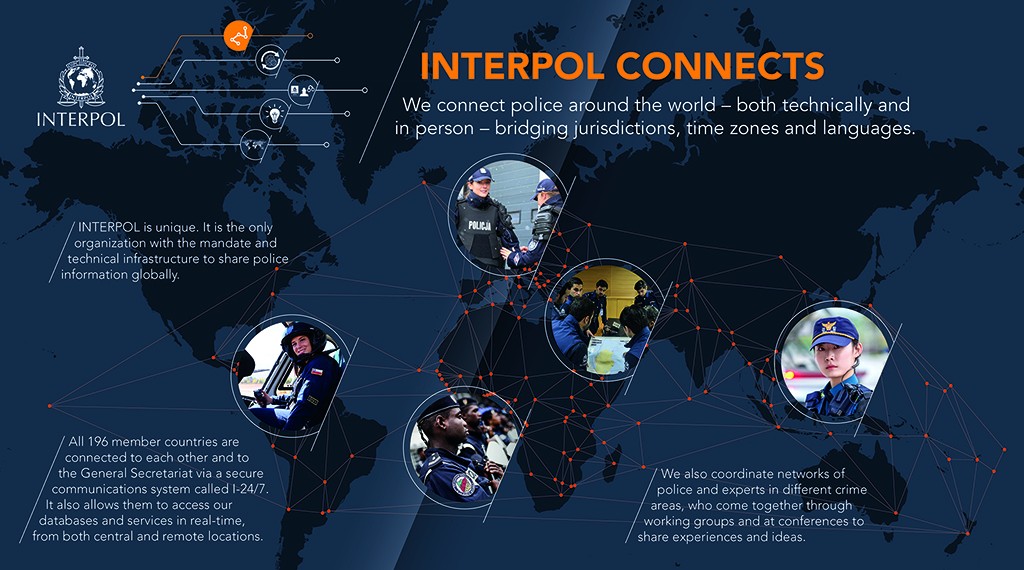
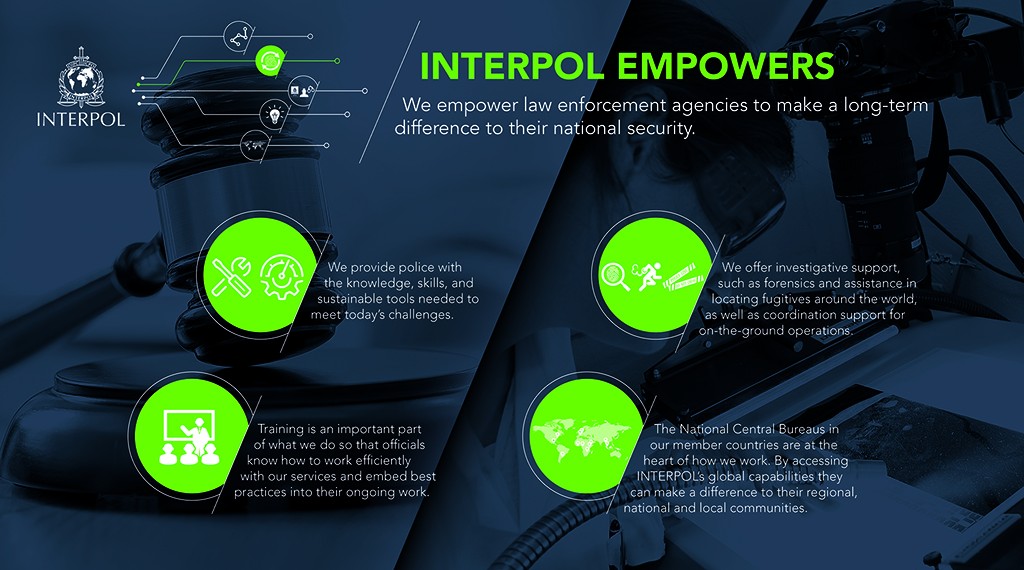
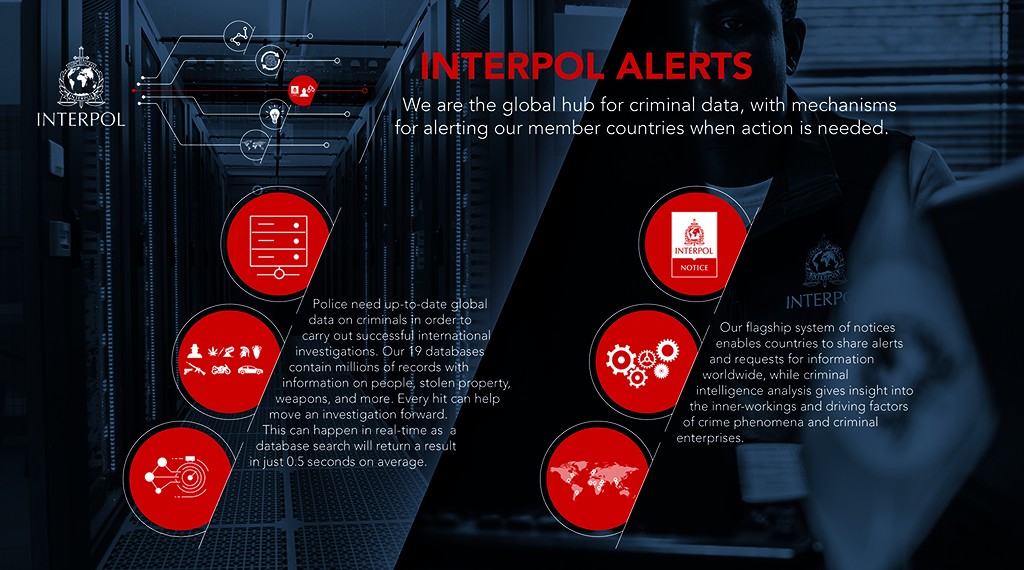
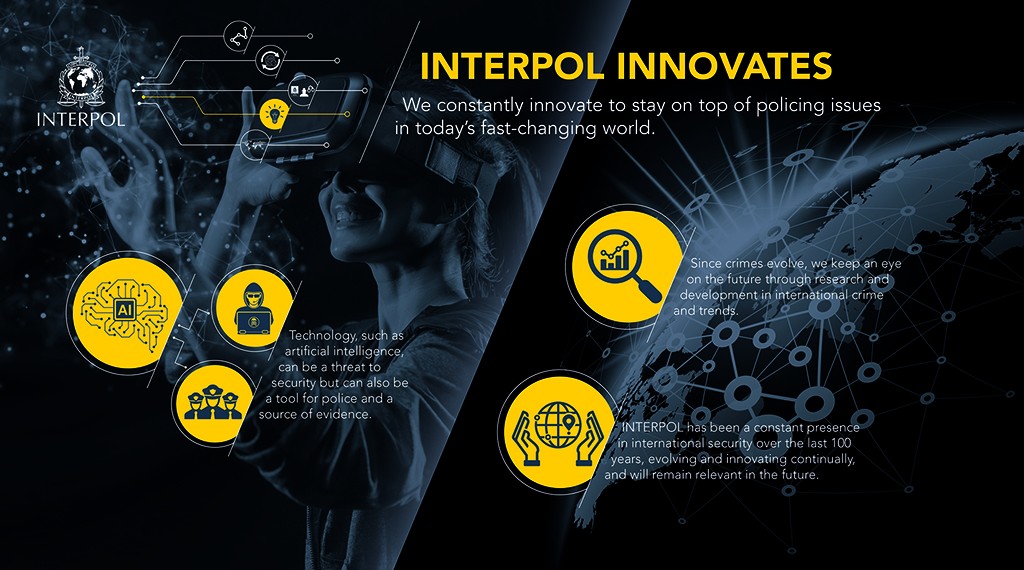
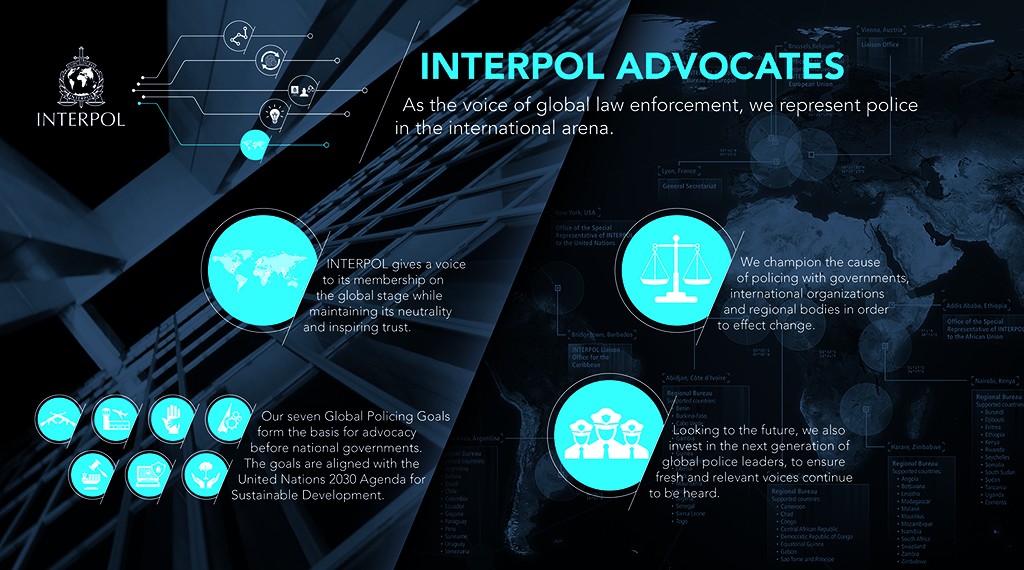
21. Call to Action: Your Questions Answered at WHAT.EDU.VN
Do you have more questions about Interpol or other topics? Are you struggling to find reliable answers quickly and for free? At WHAT.EDU.VN, we understand the challenges of accessing accurate information. You don’t have to struggle alone.
Visit WHAT.EDU.VN today to ask your questions and receive expert answers for free. Our platform is designed to provide you with quick, reliable, and easy-to-understand information, connecting you with a community of knowledgeable individuals ready to help.
We offer a free consultation service to address your questions, no matter how simple or complex. Contact us at 888 Question City Plaza, Seattle, WA 98101, United States, or reach out via WhatsApp at +1 (206) 555-7890. Your questions deserve answers, and what.edu.vn is here to provide them.
